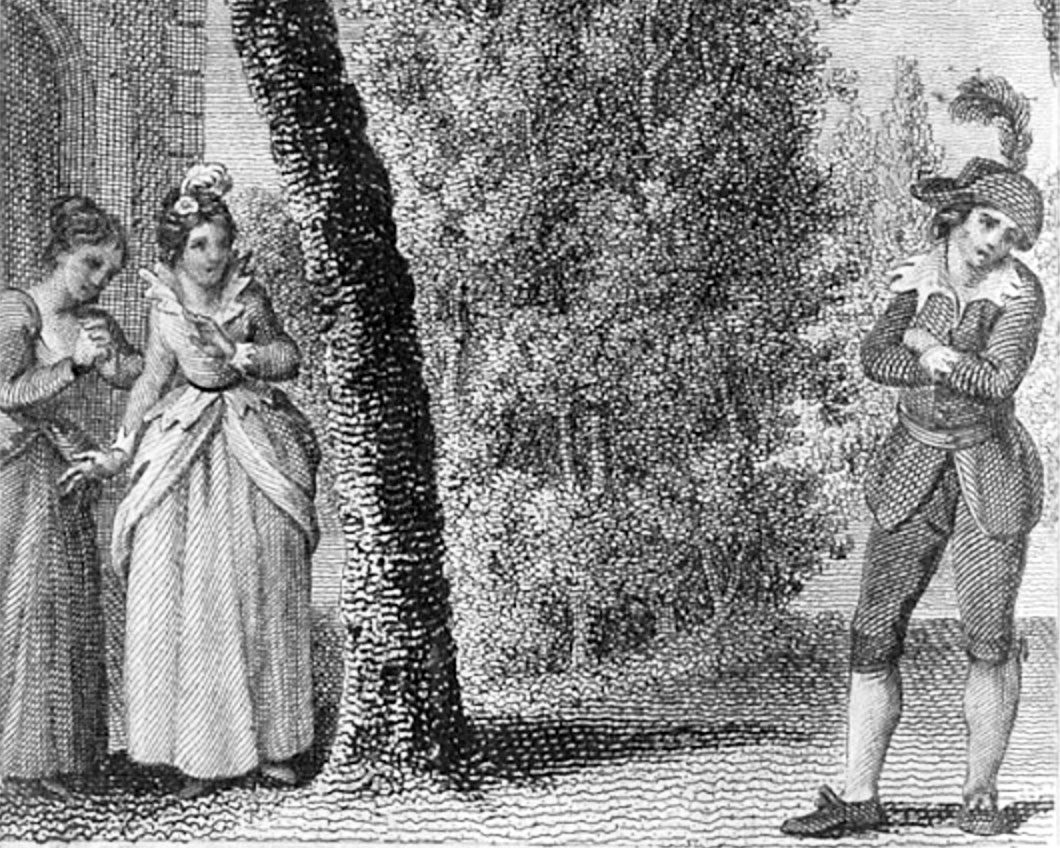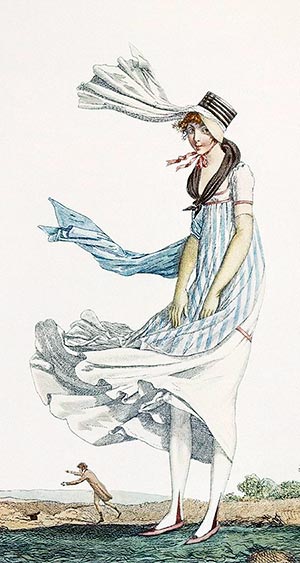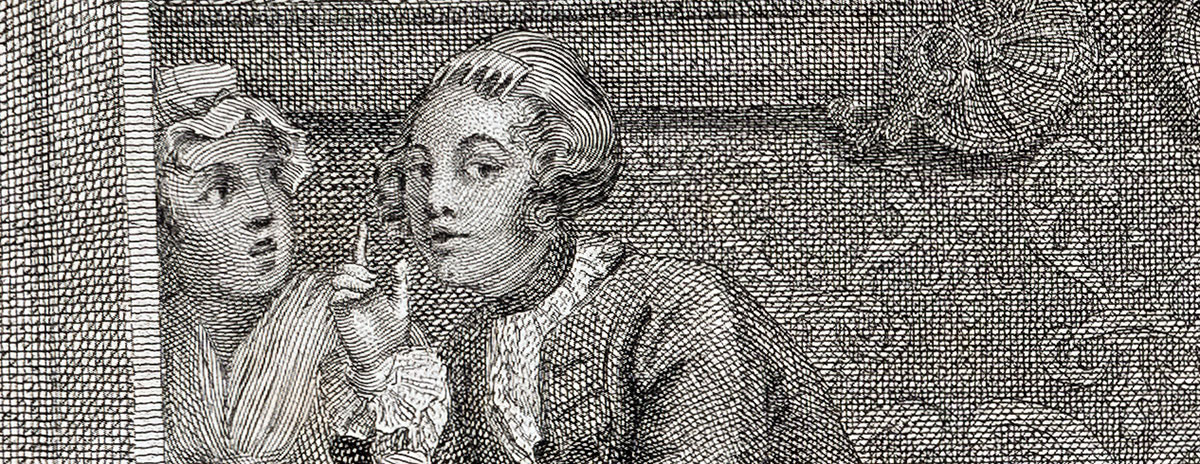February 2016
bettered novels (13)
6 February 2016, around 6.50.

A first reading of Clara Reeve’s 1777 novel The Old English Baron did not leave much of an impression. 2 In thinking back on it, I have a vague sense of a tedious simulacra of early modernity, somewhat less appealing than one of William Morris’s more feeble efforts: not at all like the book I have just recently (re)read – which, despite the attractions of vengeful ghosts and some very inept villains, is as staid a representative gothic story as one could hope to read. 3 It will not be surprising that the ghosts are pacified, the villains are exposed and exiled, and virtue triumphs (so much for the plot) – but there are two things about the The Old English Baron that struck my fancy.
First – and this is the element I am most surprised to have forgotten – the preface. Reeve sets the book as ‘the literary offspring of The Castle of Otranto, written upon the same plan, with a design to unite the most attractive and interesting circumstances of the ancient Romance and modern Novel’. This would be dull indeed, were Reeve not more particular about the methods and virtues (to be a bit Shamela-ish about it) of this alchemical union. She is quite clear on both points. As with any novel, the purpose of the gothic story is ‘first, to excite the attention; and secondly, to direct it to some useful, or at least innocent, end’; in particular, for the gothic story:
to attain this end, there is required a sufficient degree of the marvellous, to excite the attention; enough of the manners of real life, to give an air of probability to the work; and enough of the pathetic, to engage the heart in its behalf. (emphasis mine)
In short, the circumstances of the story must be – in varying degrees – unusual, credible, and pitiable. Reeve opposes, however, the facile Walpole-an equation of the unusual with the improbable, and notes that in such narratives ‘When your expectation is wound up to the highest pitch, these circumstances [citing examples from The Castle of Otranto] take it down with a witness, destroy the work of imagination, and, instead of attention, excite laughter.’ 4 This is so practical, reasonable, and commonsensical a reaction to the dangers and temptations of gothic excess, I was quite utterly charmed – as indeed would be any reader of the dread Otranto. If the result of Reeve’s calculations is rather a mild moralistic tale than a pathetic one, it is at least innocent of exciting laughter.
Second, (and I promise to be brief) although there is nothing in the text of the novel to make it seem like anything other than what it sets out to be (viz. a gothic novel comprised of documents gathered together to tell the story Edmund Twyford’s ascent and prove his claim to the position in which he finds himself at novel’s end), one could, if one were feeling artful, take the villain’s part and see Edmund as an imposter. For if the villains can lie, why cannot the servants and tenants? There is not a shred of evidence to support this view – but then given the supposed purpose of the text, to ‘furnish a striking lesson to posterity, of the over-ruling hand of Providence, and the certainty of retribution’, there wouldn’t be, would there?
- The ‘bettered books’ of the title refer to the 1898 list of one hundred great novels from the The Bookman, on which The Old English Baron appears in slot thirteen (chronologically). Although I had earlier thought of beginning with Charles Reade, that was ultimately too daunting, so I set myself the task of reading the thirty-one novels by women first; perhaps then I will move on to translations, or go century by century, or find some other manner (besides book by book) of breaking up the task.[↩]
- I also don’t really remember reading The Peoples of Canada: A Pre-Confederation History, which I apparently did around the same time.[↩]
- Perhaps the comparison to William Morris is not, then, unjust….[↩]
- E.g. ‘Oh! the helmet! the helmet!’[↩]
pragmatism
7 February 2016, around 10.11.
There are imperfections. A part of me would like to say that I have made a thing that is as perfect as possible, that the work’s flaws are entirely due to lack of technique or poor materials, but that is not the case: I have been lazy. I have made errors and, though I have fixed some of them, I have left others and fudged still more.
This applies to almost everything.
bettered novels (22.1)
13 February 2016, around 13.22.
First Impressions

At the time I considered myself a great reader 1 and East of Eden perhaps the greatest book ever written in English. So it is not a surprise that my first reading of Pride & Prejudice was not marked by any particular sympathy. It was recommended to me at the age of fourteen or fifteen by a teacher, and I’m afraid I did not like it. 2
Well, that is not wholly true. To say I did not like it assumes a more considered, sensible, and active response than perhaps I was capable of at the time: I thought it boring and plotless – by which I suppose I mean that nothing much happened. 3 Indeed, the only thing I could remember when I finished reading was a long muddy walk that was for some reason supposed to be shocking.
Although it did not strike me as a possibility at the time, the attentiveness of that first reading was perhaps questionable – especially as nothing beyond the seventh chapter appeared to have made much of an impression. A few years (and a strong dose of Byron) later, my opinions underwent a material change and, though never one to number myself among the Janeites, I have found the novels worth rereading every year or so. 4
- An evaluation which is not untrue, then as now, if one is considering quantity rather than quality of both reading and books.[↩]
- Indeed, I seldom care to have books recommended to me, much preferring to hear books praised and then decide for myself whether I am liable to like them or not. In recommending books there is always the hope of seeing someone else like something one has enjoyed, and this desire clouds even the most well-meaning judgment.[↩]
- And thinking about it now, one could probably make a case for this not being a wholly inaccurate description.[↩]
- Except for Emma, which I’ve never managed to like and barely managed to finish once.[↩]
bettered novels (22.2)
20 February 2016, around 13.25.
Ampersand

…more knowledge may be gained of a man’s real character, by a short conversation with one of his servants, than from a formal and studied narrative, begun with his pedigree, and ended with his funeral.
Although I reread Pride and Prejudice several times over the years, it was only when I read it for the first time as an ebook that I can say my reading of it materially changed. For that was when I noticed the servants. I have nothing clever to say on the matter, save that attitudes about and behavior towards servants on the part of characters is well worth watching out for, if you plan to (re)read the book soon.
Jane and Elizabeth looked at each other, and the waiter was told he need not stay. Lydia laughed, and said:
‘Aye, that is just like your formality and discretion. You thought the waiter must not hear, as if he cared! I dare say he often hears worse things said than I am going to say. But he is an ugly fellow! I am glad he is gone. I never saw such a long chin in my life. Well, but now for my news; it is about dear Wickham; too good for the waiter, is it not?’
- And of course, everyone knows that no man is hero to his valet, etc., etc.[↩]
Citation (54)
25 February 2016, around 13.34.

Pieter van der Borcht, engraving of a pelican from Sancti Epiphanii ad Physiologum (1588)
Writing, that powerful myth. The highest degree of distinction; how can it happen? How can the eye become progressively sensitive to reading, how can it get into the rhythm, the music; how can it be hurt – as if the light were bad – when a sentence doesn’t soar on strong wings? Nobody who emerges into the field of theory can do so without the soaring quill-feathers of writing. Althusser and his sentence about Mao Tse-Tung: ‘pure as the dawn’; Lévi-Strauss and his Latin prosopopoeia in all its imperial, Virgilian majesty. Lacan and his Greek, precious, baroque prosopopoeia. Derrida, or the transition to fiction. And a myriad of mediocre writings by junior masters diligently copying the rhetoric but without wings, serving up plucked chickens, birds with their breast-bones showing, naked animals.
